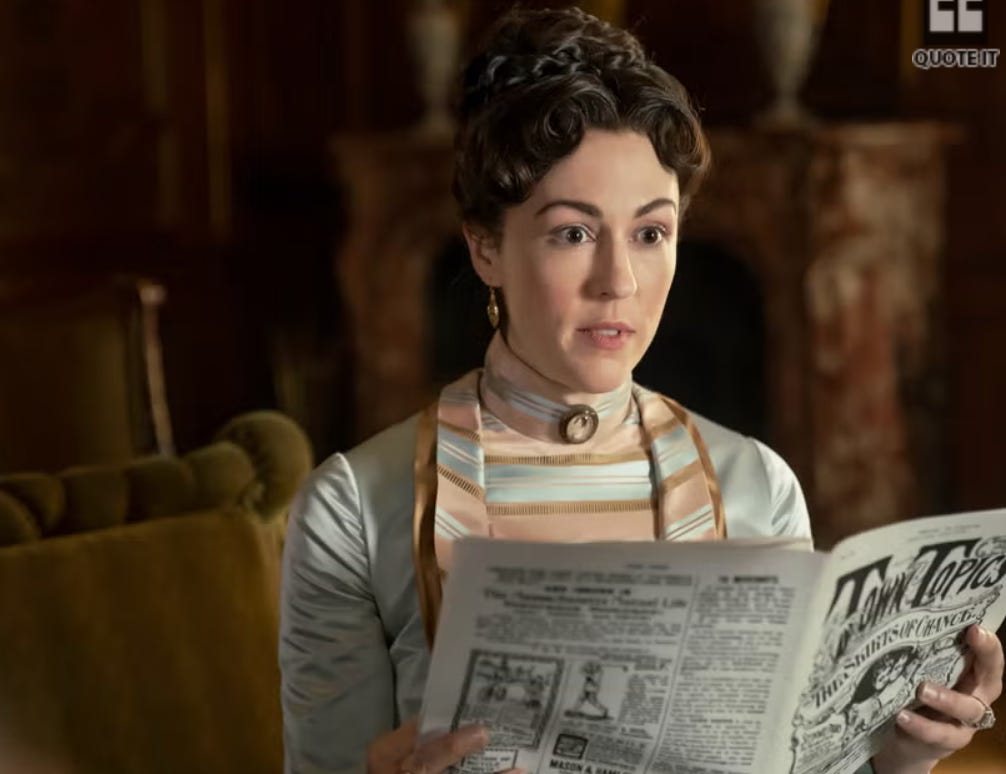I have a story in the December issue of Town & Country that I’d been wanting to do for awhile. It’s about the catch-and-kill-esque turn-of-the-century blackmail scandal that engulfed society rag Town Topics, owned by the Union Army colonel turned unscrupulous oil prospector, patent-happy entrepreneur, turncoat congressional candidate, and, eventually, gossip-slinging extortionist William D’Alton Mann. Here’s a replica of the magazine from season 2 episode 4 of Gilded Age, courtesy of HBO:
And here’s a little excerpt from the piece:
On June 21, 1905, the Manhattan banker Edwin Post received an unsettling telephone call. The man on the other end of the line said he was an editor at Town Topics and that he intended to dispatch one of his representatives to discuss an unspecified “personal matter.”
At his office the next day, Post received a visit from Charles P. Ahle, who advised Post it would be in his interest to pay $500 (about $18,000 today) for a subscription to a forthcoming Town Topics monthly offshoot called The Smart Set. Why would Post do such a thing? Because he wouldn’t want Town Topics to enlighten its readers about the “fair charmer” he’d been canoodling with in Stamford, would he? “I’ll give you some time,” Ahle said, leaving Post with much to think about.
Post was loath to see his dirty laundry aired in public, but he’d been having a bad year in the stock market and couldn’t afford to be blackmailed. Before going to the district attorney’s office, he came clean to his wife Emily Post, who was not yet a famous etiquette expert but nonetheless advised her soon-to-be ex-husband that exposing the conspiracy would be the right thing to do, not only for himself but for the greater good.
Days later, Post met Ahle at the Holland House hotel on Fifth Avenue, where he handed Ahle an envelope containing five $100 bills. Slipping the dough into his right pants pocket, Ahle suggested that Post was getting off easy. “We’ve had scandals worth $20,000,” he said. Ahle also boasted that Town Topics made most of its money from “the suppression of stories.”
Just then, a police detective who had been observing the exchange stepped forward, arrested Ahle, and hauled him down to the Elizabeth Street station. The plot had been foiled, but that was only the beginning of the story—the authorities had a bigger fish to fry.
Click here to read the rest over at Town & Country. Meanwhile, my next column for The Ankler drops tomorrow (that’s Saturday, November 23), and it’s about the legendary and lesser-known history of the Hollywood Roosevelt Hotel, from the inaugural Academy Awards in 1929, to Marilyn Monroe’s poolside photo shoots in the 1940s, to an infamous punk rock show—featuring the Go-Go’s and the Germs—on Halloween night 1978. How ‘bout a little sneak peek?
On September 12, 1951, the Hollywood Roosevelt played host to a preliminary hearing of the House UnAmerican Activities Committee, which was investigating Marxist sympathies within the movie business. The motley crew of locals called to testify included a housewife, a classical dancer, a clergyman, and a fashion designer.
“Since the committee is seeking to determine the extent of Communist infiltration into the film industry,” said the Rev. Stephen A. Fritchman, “I can see no reason for my being subpoenaed.”
Prokop J. Prokop, the aforementioned fashion designer, likewise professed bewilderment as to the committee’s interest in him. Prokop’s attorney, Ben Margolis, who famously represented the Hollywood Ten, told a reporter, “It’s a case of mistaken identity.”
To which the reporter sneeringly replied, “You mean there are two Prokop J. Prokops?”
Subscribe to the Ankler by Saturday morning and get the whole thing delivered straight to your inbox! (Or head over to theankler.com to find it on the homepage.)
Finally, check out this riveting yarn from the latest issue of Smithsonian magazine, about Leo Reuss, a Jewish actor who engaged in a daring deceit in order to remain onstage as the Nazis consolidated power:
In September 1935, the Nazi government passed the Nuremberg Race Laws, a set of legal decrees that outlawed sex or marriage between Jewish and non-Jewish Germans, forbade Jewish households to employ non-Jewish women under 45, and declared that only Germans of “Aryan” blood could be Third Reich citizens. Reuss and Straub’s relationship had become illegal. He soon left Germany for Vienna.
Less than three years later, in March 1938, Germany annexed Austria, and the situation for Jews there became dire. When Reuss arrived, however, in late 1935, Vienna still had a vibrant Jewish community free from the racist Nuremberg Laws. Ten percent of the city’s residents were Jewish, and they were especially prominent in the arts.
The problem for Reuss was that Austria’s ruling nationalist party didn’t consider him Austrian. Although he’d grown up in Vienna, his birthplace was Galicia—a region of the Austro-Hungarian Empire that was absorbed into Poland after World War I. Austria now deemed Reuss stateless, which meant he had no right to work in Vienna. So Reuss decided to hide in plain sight.
Aware that his years on the stage would make him easy to recognize, he used all his training to transform himself, from the color of his hair to his dialect, and he continued auditioning for roles. By becoming the sort of person antisemites tended to idealize, he would force his audience to confront the absurdity of the racial ideology that was on the verge of destroying Europe.
Lots more where that came from. That’s all for now, but I’ll be back soon…







